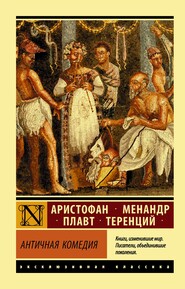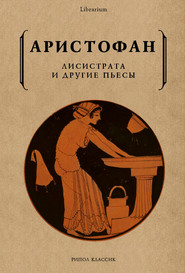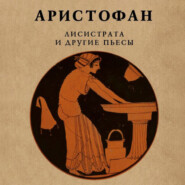По всем вопросам обращайтесь на: info@litportal.ru
(©) 2003-2024.
✖
The Eleven Comedies, Volume 1
Автор
Год написания книги
2018
Настройки чтения
Размер шрифта
Высота строк
Поля
MAGISTRATE. These women, have they made din enough, I wonder, with their tambourines? bewept Adonis enough upon their terraces?[420 - Women only celebrated the festivals of Adonis. These rites were not performed in public, but on the terraces and flat roofs of the houses.] I was listening to the speeches last assembly day,[421 - The Assembly, or Ecclesia, was the General Parliament of the Athenian people, in which every adult citizen had a vote. It met on the Pnyx hill, where the assembled Ecclesiasts were addressed from the Bema, or speaking-block.] and Demostratus,[422 - An orator and statesman who had first proposed the disastrous Sicilian Expedition, of 415-413 B.C. This was on the first day of the festival of Adonis—ever afterwards regarded by the Athenians as a day of ill omen.] whom heaven confound! was saying we must all go over to Sicily—and lo! his wife was dancing round repeating: Alas! alas! Adonis, woe is me for Adonis!
Demostratus was saying we must levy hoplites at Zacynthus[423 - An island in the Ionian Sea, on the west of Greece, near Cephalenia, and an ally of Athens during the Peloponnesian War.]—and lo! his wife, more than half drunk, was screaming on the house-roof: "Weep, weep for Adonis!"—while that infamous Mad Ox[424 - Cholozyges, a nickname for Demostratus.] was bellowing away on his side.—Do ye not blush, ye women, for your wild and uproarious doings?
CHORUS OF OLD MEN. But you don't know all their effrontery yet! They abused and insulted us; then soused us with the water in their water-pots, and have set us wringing out our clothes, for all the world as if we had bepissed ourselves.
MAGISTRATE. And 'tis well done too, by Poseidon! We men must share the blame of their ill conduct; it is we who teach them to love riot and dissoluteness and sow the seeds of wickedness in their hearts. You see a husband go into a shop: "Look you, jeweller," says he, "you remember the necklace you made for my wife. Well, t'other evening, when she was dancing, the catch came open. Now, I am bound to start for Salamis; will you make it convenient to go up to-night to make her fastening secure?" Another will go to a cobbler, a great, strong fellow, with a great, long tool, and tell him: "The strap of one of my wife's sandals presses her little toe, which is extremely sensitive; come in about midday to supple the thing and stretch it." Now see the results. Take my own case—as a Magistrate I have enlisted rowers; I want money to pay 'em, and lo! the women clap to the door in my face.[425 - The State treasure was kept in the Acropolis, which the women had seized.] But why do we stand here with arms crossed? Bring me a crowbar; I'll chastise their insolence!—Ho! there, my fine fellow! (addressing one of his attendant officers) what are you gaping at the crows about? looking for a tavern, I suppose, eh? Come, crowbars here, and force open the gates. I will put a hand to the work myself.
LYSISTRATA. No need to force the gates; I am coming out—here I am. And why bolts and bars? What we want here is not bolts and bars and locks, but common sense.
MAGISTRATE. Really, my fine lady! Where is my officer? I want him to tie that woman's hands behind her back.
LYSISTRATA. By Artemis, the virgin goddess! if he touches me with the tip of his finger, officer of the public peace though he be, let him look out for himself!
MAGISTRATE (to the officer). How now, are you afraid? Seize her, I tell you, round the body. Two of you at her, and have done with it!
FIRST WOMAN. By Pandrosos! if you lay a hand on her, I'll trample you underfoot till you shit your guts!
MAGISTRATE. Oh, there! my guts! Where is my other officer? Bind that minx first, who speaks so prettily!
SECOND WOMAN. By Phoebé, if you touch her with one finger, you'd better call quick for a surgeon!
MAGISTRATE. What do you mean? Officer, where are you got to? Lay hold of her. Oh! but I'm going to stop your foolishness for you all!
THIRD WOMAN. By the Tauric Artemis, if you go near her, I'll pull out your hair, scream as you like.
MAGISTRATE. Ah! miserable man that I am! My own officers desert me. What ho! are we to let ourselves be bested by a mob of women? Ho! Scythians mine, close up your ranks, and forward!
LYSISTRATA. By the holy goddesses! you'll have to make acquaintance with four companies of women, ready for the fray and well armed to boot.
MAGISTRATE. Forward, Scythians, and bind them!
LYSISTRATA. Forward, my gallant companions; march forth, ye vendors of grain and eggs, garlic and vegetables, keepers of taverns and bakeries, wrench and strike and tear; come, a torrent of invective and insult! (They beat the officers.) Enough, enough! now retire, never rob the vanquished!
MAGISTRATE. Here's a fine exploit for my officers!
LYSISTRATA. Ah, ha! so you thought you had only to do with a set of slave-women! you did not know the ardour that fills the bosom of free-born dames.
MAGISTRATE. Ardour! yes, by Apollo, ardour enough—especially for the wine-cup!
CHORUS OF OLD MEN. Sir, sir! what use of words? they are of no avail with wild beasts of this sort. Don't you know how they have just washed us down—and with no very fragrant soap!
CHORUS OF WOMEN. What would you have? You should never have laid rash hands on us. If you start afresh, I'll knock your eyes out. My delight is to stay at home as coy as a young maid, without hurting anybody or moving any more than a milestone; but 'ware the wasps, if you go stirring up the wasps' nest!
CHORUS OF OLD MEN. Ah! great gods! how get the better of these ferocious creatures? 'tis past all bearing! But come, let us try to find out the reason of the dreadful scourge. With what end in view have they seized the citadel of Cranaus,[426 - The second (mythical) king of Athens, successor of Cecrops.] the sacred shrine that is raised upon the inaccessible rock of the Acropolis? Question them; be cautious and not too credulous. 'Twould be culpable negligence not to pierce the mystery, if we may.
MAGISTRATE (addressing the women). I would ask you first why ye have barred our gates.
LYSISTRATA. To seize the treasury; no more money, no more war.
MAGISTRATE. Then money is the cause of the War?
LYSISTRATA. And of all our troubles. 'Twas to find occasion to steal that Pisander[427 - The leader of the Revolution which resulted in the temporary overthrow of the Democracy at Athens (413, 412 B.C.), and the establishment of the Oligarchy of the Four Hundred.] and all the other agitators were for ever raising revolutions. Well and good! but they'll never get another drachma here.
MAGISTRATE. What do you propose to do then, pray?
LYSISTRATA. You ask me that! Why, we propose to administer the treasury ourselves.
MAGISTRATE. You do?
LYSISTRATA. What is there in that to surprise you? Do we not administer the budget of household expenses?
MAGISTRATE. But that is not the same thing.
LYSISTRATA How so—not the same thing?
MAGISTRATE. It is the treasury supplies the expenses of the War.
LYSISTRATA. That's our first principle—no War!
MAGISTRATE. What! and the safety of the city?
LYSISTRATA. We will provide for that.
MAGISTRATE You?
LYSISTRATA Yes, just we.
MAGISTRATE. What a sorry business!
LYSISTRATA. Yes, we're going to save you, whether you will or no.
MAGISTRATE. Oh! the impudence of the creatures!
LYSISTRATA. You seem annoyed! but there, you've got to come to it.
MAGISTRATE. But 'tis the very height of iniquity!
LYSISTRATA. We're going to save you, my man.
MAGISTRATE. But if I don't want to be saved?
LYSISTRATA. Why, all the more reason!
MAGISTRATE. But what a notion, to concern yourselves with questions of Peace and War!
LYSISTRATA. We will explain our idea.
MAGISTRATE. Out with it then; quick, or … (threatening her).











